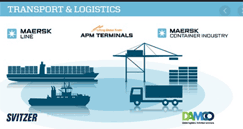In 2018, Soren Skou, CEO of Maersk, said that "We are building a company that is a global integrator of container logistics – a company very similar to UPS and FedEx; and I hope they will be considered peers of ours when we are done with this transformation journey in three to five years; a network-based, asset-based global logistics company."
The analysts at Drewry Shipping noted earlier this year that Maersk is one of a few ocean carriers that are charting a business course on becoming more end-to-end logistics companies.
Supply Chain Digest Says... |
|
|
At the time, Drewry said that carriers such as Maersk and rival CMA CGM are choosing this ambitious path hoping to leverage their size by delivering service across more parts of the supply chain. The anticipated result: grabbing more of the total revenue and profits from the complete move.
More news on that topic this week, as Skou told the Wall Street Journal that "Today up to 80% of our earnings comes from container shipping. Hopefully a couple of years from now will be much closer to a 50-50 scenario between ocean and non-ocean services."
This of course would dramatically reshape the global logistics landscape, with many consequences for both shippers and logistics service providers.
And there is perhaps solid thinking behind the changing strategy. Maersk Line, the world's largest container line, saw its revenue fall from $60 billion in 2011 to $35 billion in 2016, the victim of falling rates that resulted from a flattening of global trade and seemingly never ending additions to global container shipping capacity.
With the fundamentals of the business remaining challenged, Maersk hopes to find more success and stability as a provider of a broader set of logistics services – really a rather remarkable change.
Maersk has about 20% of the global container shipping market, and claims some 70,000 customers, many of which might be open to expanding their relationship to other logistics services.
"For Maersk and some of its oceangoing rivals, the business of managing goods before and after they move on ships is looking especially attractive after several years of sagging freight rates have eaten away at profit margins," the Wall Street Journal reports.
Earlier this year, CMA CGM showed its similar strategic thought by acquiring the shares of 3PL Ceva Logistics it did not already own."
In addition to flattening container volumes, a trend exaggerated by the trade wars that are depressing imports in both the US and China, the market views container shipping as a pure commodity service, driving business to the lowest priced carrier.
(See More Below)
|
CATEGORY SPONSOR: SOFTEON |
|
|
|
|
|
"Providing a service which appeals directly to shippers, potentially as an alternative to forwarders, seems to be its solution to this," Nick Bailey, the head of research at U.K.-based Transport Intelligence Ltd, told the Journal.
Of course, Maersk has been in parts of the logistics business for many years.
Maersk's APM Terminals division runs operations in 76 ports in more than 100 inland cargo-handling locations around the world. In North America, Maersk and its freight forwarding division Damco manage some 20 distribution centers across the US.
 But those numbers pale in comparison to now rival logistics companies, which have hundreds or even more than 1000 DCs globally. But those numbers pale in comparison to now rival logistics companies, which have hundreds or even more than 1000 DCs globally.
And while the third-party logistics market has not exactly been known for high margins, it is still showing mostly strong growth, as companies outsource more of their logistics operations over time.
"We want to do that. We want to run the warehouse, receive the goods, stuff it into containers, ship it to the U.S. and provide a data feed that says the yellow swim trunks are in that box," Skou also told the Journal. "Then we take it out of the containers," and send the goods by trucks to distribution centers closer to the final delivery point.
Skou added the company is planning for growth in logistics services for the global automotive and chemical sectors, for which Maersk would run the process from customs clearance to distribution center deliveries.
However, SKU said it isn't looking to invest in trucking capabilities. But it does plan on a series of acquisitions to power its transformation.
For example, Maersk acquired customs house brokerage Vandegrift Forwarding Co. earlier this year. There may be other moves soon. Skou says he plans to complete the transformation by the end of 2021.
Whatever comes out in the end, it simply won't be your Dad's Maersk Line any more.
Do you think Maersk will be successful with this grand strategy? Let us know your thoughts at the Feedback section below.
Your Comments/Feedback
|